Possessed Blu-ray Movie
HomePossessed Blu-ray Movie 
Warner Archive CollectionWarner Bros. | 1947 | 108 min | Not rated | Oct 21, 2014
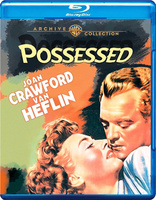
Movie rating
7.3 | / 10 |
Blu-ray rating
| Users | 4.5 | |
| Reviewer | 4.0 | |
| Overall | 4.1 |
Overview
Possessed (1947)
A married woman's passion for a former love drives her mad.
Starring: Joan Crawford, Van Heflin, Raymond Massey (I), Geraldine Brooks, Stanley RidgesDirector: Curtis Bernhardt
| Film-Noir | 100% |
| Thriller | Insignificant |
| Drama | Insignificant |
Specifications
Video
Video codec: MPEG-4 AVC
Video resolution: 1080p
Aspect ratio: 1.37:1
Original aspect ratio: 1.37:1
Audio
English: DTS-HD Master Audio 2.0 Mono (48kHz, 24-bit)
Subtitles
English SDH
Discs
50GB Blu-ray Disc
Single disc (1 BD)
Playback
Region free
Review
Rating summary
| Movie | 4.0 | |
| Video | 4.5 | |
| Audio | 4.5 | |
| Extras | 2.5 | |
| Overall | 4.0 |
Possessed Blu-ray Movie Review
Love Hurts
Reviewed by Michael Reuben October 29, 2014Often cited as the best performance of star Joan Crawford's career, Possessed is a film that doesn't hesitate to risk going off the deep end, over the top or off the charts; choose your favorite metaphor for the extreme, and Possessed fulfills it. Because of its visual style and overtly Freudian psychology, Possessed is often called a film noir. Indeed, the featurette included in the Blu-ray extras calls it the "quintessential" film noir, but it has never struck me as so easy to categorize. Classics of film noir like Double Indemnity or Out of the Past are stories about venal people whose actions are motivated by lust and greed, usually more the latter than the former, but the heroine of Possessed (if you can call her that) is driven by an irrational passion of which the motivation remains obscure. Some commentators have called it amour fou ("crazy love"), which is as good a description as any. One of the main reasons that Crawford is so impressive in the role is that she is able to make this insanity believable, as her character struggles (and fails) to control it, while it slowly corrodes a life that, to all outward appearances, should be idyllic. Crawford made Possessed two years after her Oscar-winning role in Mildred Pierce, and it got her another nomination. The director was Curtis Bernhardt, a German-Jewish refugee who had just directed Bette Davis in A Stolen Life and was regarded at Warner Bros. as a "woman's director". Using all the stylistic tricks of German Expressionism, Bernhardt crafted a harrowing melodrama that blurred the lines, not so much between right and wrong, but between real events and imaginary ones, as Crawford's character gradually loses her ability to tell the difference.
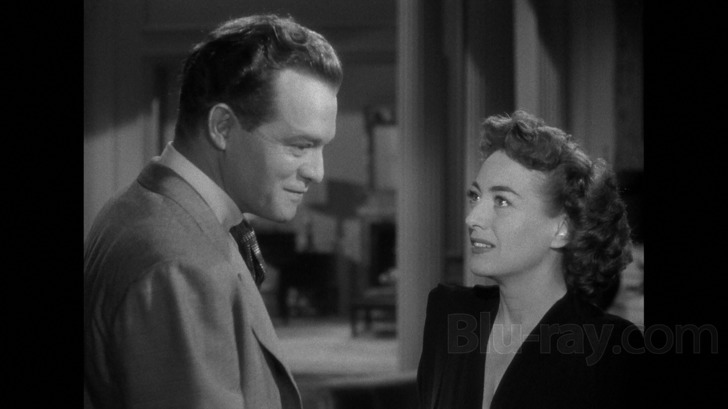
Possessed has a memorable opening on the streets of early morning Los Angeles, as a barely conscious woman, whose name we will later learn is Louise Howell (Crawford) wanders aimlessly, eventually collapsing in a café. The only word she can say is "David", until a psychiatrist at the hospital where she is admitted, Dr. Willard (Stanley Ridges), eases her nearly catatonic paralysis with drug therapy. Haltingly, Louise recounts her history to the doctor in a kind of Freudian "talking cure" (although it isn't clear by the end whether she is cured). The "David" she was seeking is David Sutton (Van Heflin), an engineer and confirmed bachelor with whom Louise had a passionate and secret affair while working for David's neighbors and long-time friends, Dean Graham (Raymond Massey), a wealthy industrialist, and his invalid wife. Louise was Mrs. Graham's nurse. Despite Louise's increasingly desperate pleas, David breaks off the affair and takes a position with Graham's company in Canada to get as far away from Louise as possible. It's open to the viewer's interpretation whether Louise is suffocatingly clingy, or David is just a cad; the film picks up the relationship at such a late stage that it's impossible to say where it went wrong. What's clear, though, is that the breakup starts Louise on a steady descent into madness that subsequent events only accelerate. Louise might have had a chance if she had managed to get away herself and start over, but she finds herself increasingly entangled in the Graham family, especially after Mrs. Graham dies (under mysterious circumstances that suggest . . . well, never mind). The family moves back to Washington, D.C., where Louise becomes the caretaker of the younger child, a boy named Wynn (Gerald Perreau), but the teenaged daughter, Carol (Geraldine Brooks), is less than welcoming. The rocky relationship between Louise and Carol sometimes recalls the rivalry between Mildred Pierce and her daughter, Veda, especially when David Sutton returns from Canada and Carol Graham, who had a childhood crush on David, begins flirting with him as a young adult. (David barely takes her seriously, but Louise isn't so objective.) The difference is that Mildred Pierce was a determined woman capable of taking charge of both herself and her circumstances, whereas Louise is the opposite. She can only fantasize about being someone in control, and her fantasies have a way of seizing both her perception and the camera's eye, so that neither can be trusted to tell the truth. Because Possessed is told entirely from Louise's point of view, everything in it is extreme and outsized: the emotions, the dialogue (real and imagined), the sound effects, the score, the sharp interplay of shadow and light. But even within these extremes, Crawford's ability to modulate Louise's reactions, as she struggles to maintain appearances while crumbling inside, is one of the great feats of screen acting, because she does so much of it without words. She keeps Louise believably afloat until the rushing waves of paranoia overwhelm her, and she surrenders to the undertow of madness that has been pulling her down throughout the film. But she doesn't go quietly, and she doesn't go alone.
Possessed Blu-ray Movie, Video Quality 
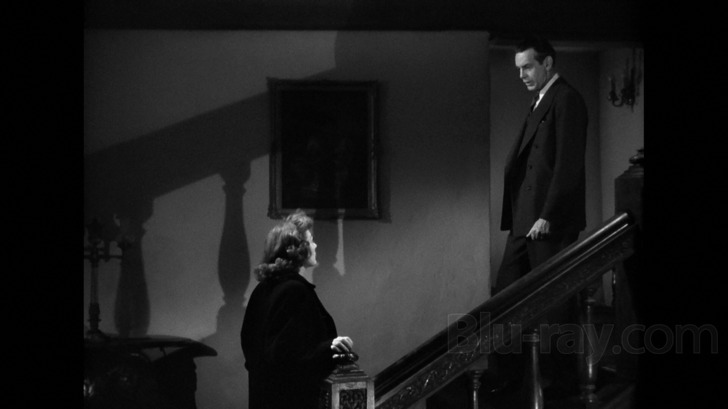
The Warner Archive Collection has produced another sterling rendition of a black-and-white classic with its 1080p, AVC-encoded Blu-ray of Possessed, which was shot by Joseph A. Valentine (Shadow of a Doubt, Rope and Victor Fleming's Joan of Arc). The blacks, grays and whites are precisely rendered with excellent densities, giving the image an almost tactile quality that is essential to director Bernhardt's compositions, which are often deliberately unsettling: claustrophobic, oddly angled, off-balance. In scene after scene, Crawford's Louise is crowded by objects in the frame, bisected by shadows or props, imprisoned by pillars, windows frames or shadows cast by stair railings or other architectural elements. The commentary by Drew Casper points out more of these than you ever thought possible, and once you start looking for them, they're everywhere. Not since Possessed was shown on 35mm film have they been so easy to spot. The film's grain pattern appears to be fine and natural, and the detail is consistently excellent throughout (except, of course, where scenes are intentionally dark). WAC has followed its usual practicing of mastering the disc at a high average bitrate, in this case 38.00 Mbps.
Possessed Blu-ray Movie, Audio Quality 
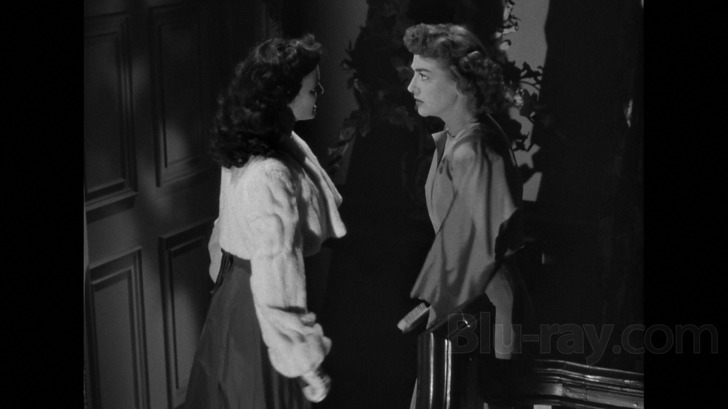
Possessed's original mono track is presented in lossless DTS-HD MA 2.0, with identical left and right front channels. Although the dynamic range is limited by contemporary standards, the track has very good fidelity, with no noise or interference. The dialogue is clear, and certain key sound effects (e.g., the roar of a boat motor that's just a little too loud) have the impact needed to help convey Louise's state of mind. The score by Oscar winner Franz Waxman (Sunset Boulevard and A Place in the Sun) may strike some viewers as overcooked, but it is consistent with the film's overall style and the overwrought state of its protagonist. Within the limits of the source, the score sounds very good indeed.
Possessed Blu-ray Movie, Special Features and Extras 
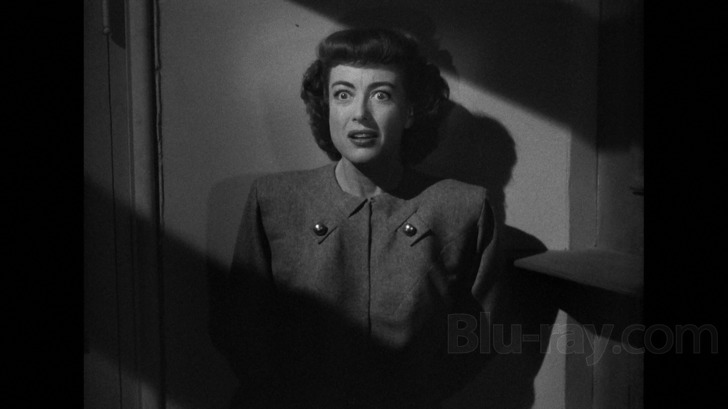
The extras have been ported over from Warner's 2005 DVD of Possessed, which was also included in the first volume of The Joan Crawford Collection.
- Commentary by Film Historian Drew Casper: If one were to borrow a term from some of the critical theorists that Prof. Casper has obviously studied, one might say that his commentary is "overdetermined", which, in this context, means that he has so many competing elements pulling his comments this way, then another, that he sometimes literally gets stuck on a phrase and has to pause and re-set. A devoted Crawford fan, Casper includes his personal reminiscences of the star, after meeting her late in her life, as well as a biographical overview. He discusses film noir at length, although this is perhaps the least illuminating portion of the commentary. The longest part consists of a blow-by-blow account of the lighting, sound effects, edits and other techniques in Possessed that Casper considers to be film noir signatures.
- Possessed: The Quintessential Film Noir (480i; 1.33:1; 9:33): An assortment of film scholars (including Drew Casper) describe the rise of what would later be called film noir, and they also make the case for Possessed as a classic of the genre. As with Casper's commentary, I find the arguments intriguing but ultimately unpersuasive. The film strikes me as a melodrama that shares some elements with film noir, but lacks others that are essential (notably, greed).
- Trailer (480i; 1.33:1; 2:05): Appropriately lurid: "Possessed . . . by the maddest love a woman ever knew!"
Possessed Blu-ray Movie, Overall Score and Recommendation 
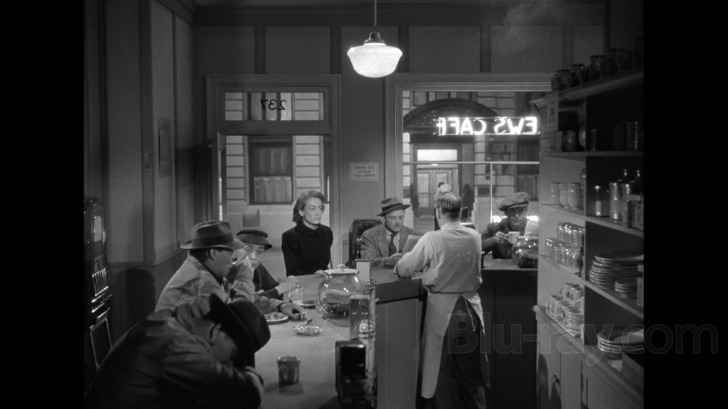
Possessed is not a film for all tastes. For fans of Joan Crawford, it is essential viewing; indeed, as commentator Drew Casper emphasizes, it's a film that seems to have been made for her fans. Film noir fans may respond to it or may feel, as I do, that to call Possessed a film noir is to stretch the genre's meaning past the breaking point. Whether or not the film holds personal appeal, it marks an important collaboration between one of old Hollywood's defining stars and several crucial talents behind the camera, and the craftsmanship is undeniable. WAC has preserved another classic from the vaults in a durable Blu-ray presentation. Highly recommended.
Similar titles
Similar titles you might also like

Leave Her to Heaven
1945

The Dark Mirror
1946

Don't Bother to Knock
Limited Edition to 3000
1952

Murder, My Sweet
Warner Archive Collection
1944

Scarlet Street 4K
1945

Out of the Past
Warner Archive Collection
1947

Crime of Passion
1957

Sorry, Wrong Number
1948

The Strange Affair of Uncle Harry
1945

The Glass Key
1942

The Strange Love of Martha Ivers
4K Restoration
1946

I Confess
Warner Archive Collection
1953

The Night Holds Terror
1955

Spellbound
1945

711 Ocean Drive
1950

I Wake Up Screaming
Hot Spot
1941

The Long Goodbye
4K Restoration
1973

So Evil My Love
1948

Too Late for Tears
1949

He Walked by Night
4K Restoration
1948